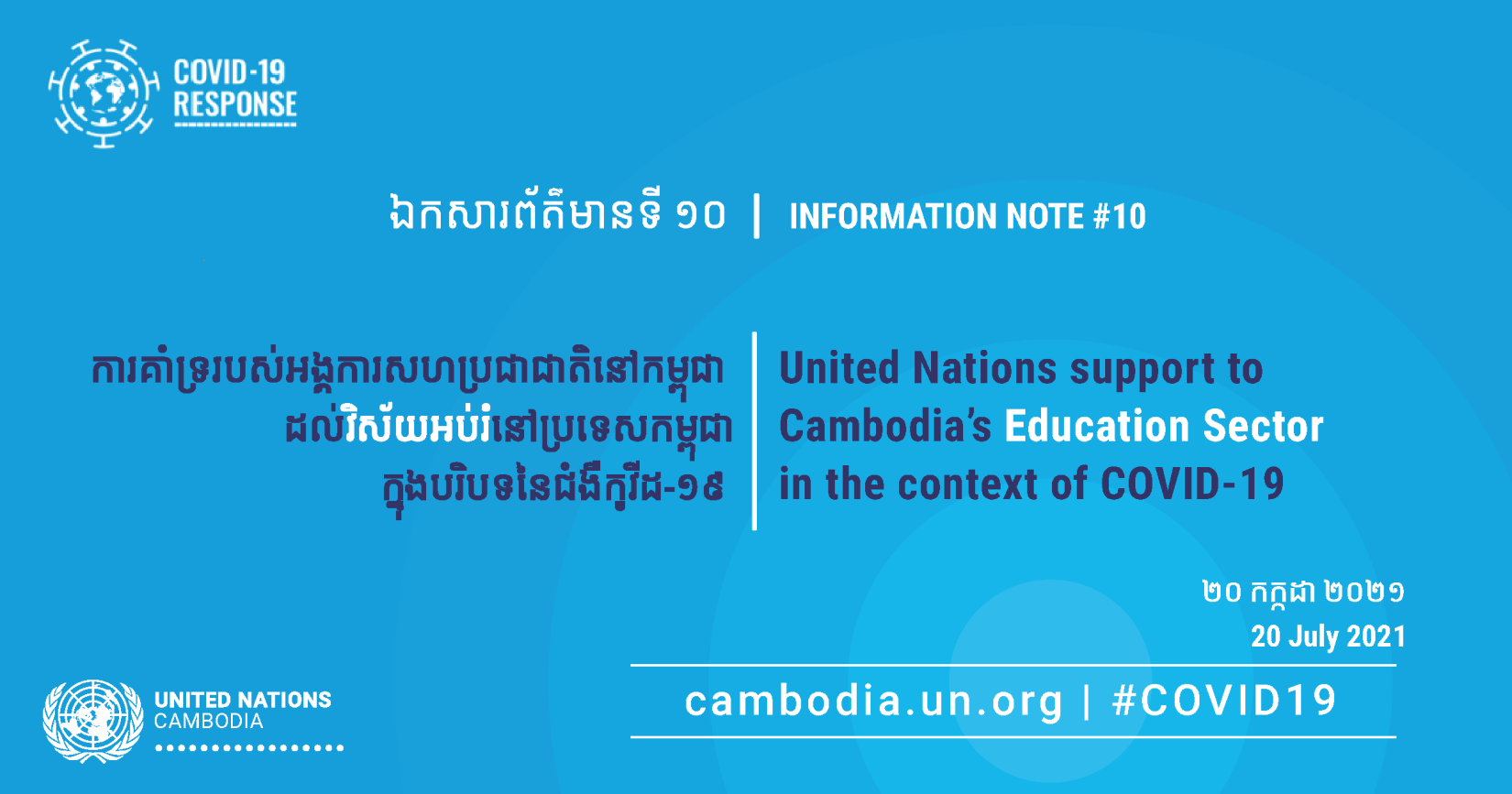Information Note #10: United Nations support to Cambodia’s Education Sector in the context of COVID-19
20 July 2021

Education is critical for children’s personal development and lifetime prospects. It is key for escaping poverty, reducing inequality and it drives sustainable development. The COVID-19 pandemic has disrupted education and school attendance globally. In Cambodia, since March 2020, schools have been closed for over 200 days, interrupting learning for approximately 3.2 million learners. Education losses drive drastic declines in human development, with estimates of Cambodia’s Human Development Index (HDI) for 2020 revealing a decline of 3.93% from 2019, equivalent to erasing all progress made in the past four years.[1] Prior to the pandemic Cambodia was already off-track to meet sustainable development goal (SDG) 4 on quality learning and the pandemic risks undermining any progress made.
It is not yet known when schools might reopen. The risk of children never returning to school increases with time, especially for children from vulnerable groups. The pandemic has exacerbated existing inequalities and risks deepening the digital divide. School closures have an impact beyond learning, affecting the ability of many parents and carers, especially women, to work, reducing access to nutritious food for many children and increasing the risks of violence against children. Global evidence continues to show that schools are not the main drivers of transmission and can be reopened safely[2].
The United Nations has been partnering with the Royal Government of Cambodia since the start of the pandemic, through the Ministry of Education, Youth and Sport (MoEYS) to assist the country to adapt, respond and recover from the impacts of COVID-19 on education. The United Nations’ efforts are aimed at providing a holistic package of support to children to foster continued access to quality education for all learners across the country and to ensure that no child is left behind.
A Joint Education Needs Assessment conducted jointly by the Ministry of Education, Youth and Sport (MoEYS) and the Education Sector Working Group (ESWG), which the United Nations chairs, demonstrated that children have unequal opportunities to continue their learning, leading to substantive learning losses across all levels. While around 70% have been able to continue their education, only around 30% have access to online learning materials and 32% rely only on paper-based materials. Children from IDPoor households or with disabilities continue to face the greatest challenges. Analysis shows that 40% of households report having less food than before and 20% of boys and girls self-report having faced increased risk of violence or abuse due to school closures.
To assist children to continue learning during school closures, the United Nations and its partners work to produce inclusive distance learning materials for children at all levels. These include online platforms, television and radio. Paper-based distance learning materials have been regularly distributed to students across the country, particularly benefitting disadvantaged students without access to the internet or other information sharing platforms. Where relevant, learning materials have been translated into four indigenous ethnic minority languages, braille, and Cambodian sign language. Home learning packages for all public-school children in Grades 1 and 2 (approximately 750,000 children), have also been procured, given the vulnerability of this age group to learning losses. A complementary package in four minority languages will reach 5,000 children in the northeast. COVID-19 prevention and vaccination related information is also included in this package to support the vaccination efforts.
In the non-formal sub-sector, the United Nations is scaling up efforts to ensure that at least 300,000 (50% female) lower secondary school students and out-of-school youth can continue to access the most up-to-date learning resources through the Basic Education Equivalency Programme (BEEP) platform. In partnership with the Ministry of Education, Youth and Sport (MoEYS), the United Nations is upgrading the BEEP platform to ensure continued learning of more learners; opened new BEEP Learning Centres in remote areas; digitized content; and provided supplementary, alternative and flexible learning opportunities to students currently enrolled at lower secondary schools.
The United Nations has also provided significant support to teachers. For example, a Continuous Professional Development has been developed, in alignment with the Teacher Career Pathway. The United Nations has been supporting distance and online learning by procuring tablets with free mobile internet data for all Provincial Teacher Training College (PTTC) teacher trainers. The United Nations coordinates the ongoing development and implementation of blended in-service training to upgrade PTTC teacher trainers’ ICT and innovative teaching methodology for distance, online education.
Recognizing the impact that COVID-19 restrictions have had on the ability of poor households to meet household food and nutrition needs during school closures, the United Nations has re-purposed school feeding resources to provide household food rations to poor families who usually participate in the pre-primary and primary school meals programme. To date, the United Nations, in partnership with Ministry of Education, Youth and Sport (MoEYS), has provided assistance four times to over 90,000 households across ten provinces, complementing other COVID19 relief efforts, helping households meet food needs and encouraging poor families to keep children learning.
To support the safe re-opening of schools during 2020, the United Nations provided basic cleaning and hygiene supplies to all of Cambodia’s 13,300 public schools, benefitting 3.2 million students. With funding partners, the United Nations distributed US$4.2 million as block grants to primary and lower secondary schools nationwide prior to the start of the new school year in January 2021 to assist schools to meet additional costs associated with education service provision in the context of COVID19.
Risk communication and engagement with school communities have been supported by the United Nations. In September 2020, the United Nations, together with Ministry of Education, Youth and Sport (MoEYS), launched a nationwide Back to School campaign, stressing the importance of good hygiene and COVID19 preventive measures. School infrastructure projects focusing on WASH infrastructure were scaled up to ensure adequate facilities for a safe return to school. A second phase of the nationwide Back to School campaign commenced in January 2021, addressing all aspects of children’s wellbeing: education, health, nutrition and protection. The development of a “Safe School Operations handbook” (113,006 copies), and its distribution to over 16,000 schools in Cambodia, ensured that all teachers and school directors were able to start the school year prepared.
To complement the campaign, the United Nations invested in a 12-month Communication for Education (C4E) initiative to promote community demand for education and accountability of local authorities for the delivery of COVID-19 safe education. This initiative is working to reach and connect with vulnerable communities in six target provinces (Ratanakiri, Mondulkiri, Stueng Treng, Kratie, Kampong Chhnang and Koh Kong). Since the 20 March 2021 school closures, both the Back to School campaign and C4E initiative were adjusted to include messages encouraging children to continue learning via distance learning programmes with support from parents and teachers.
The United Nations commends Cambodia’s initiative to prioritize vaccinations for teachers. Cambodia is one of the 17 countries to have prioritized vaccination among teachers, and to date approximately 85% of both public and private teachers have been fully vaccinated. The United Nations acknowledges the recent announcement by the Royal Government that the country is considering COVID-19 vaccinations for children aged 12-17 years. Evidence and guiding policies on COVID-19 vaccination among children are however still emerging. In line with current global WHO guidance, and given the constrained global supply of COVID-19 vaccines, the United Nations recommends that adults and those with higher risk to infection and the most vulnerable should continue to be prioritized for vaccination. Children with underlying medical risks to develop severe Covid-19 infection are recommended to be vaccinated, but only after adults with underlying medical conditions have been reached at a high coverage with two doses. Planning ahead is encouraged and countries considering the vaccination of younger age groups also need to consider the safety and efficacy of COVID-19 vaccines for children given potential risks and benefits.
The Ministry of Education, Youth and Sport’s active participation in the Global Education Coalition, which was established in response to COVID-19, is also acknowledged, along with the commitment by the Ministry of Education, Youth and Sport’s to reach an allocation of 20% of total Government budget expenditure to education, up from a current 18.38%, from 2022. Ensuring sufficient financing for education is vital for recovery and to help offset losses in educational attainment during the pandemic.
Education is a fundamental human right and a driver of progress across all 17 sustainable development goals. The United Nations continues to encourage and support the Royal Government of Cambodia to prioritise the safe reopening of schools at the earliest moment possible and to keep them open to the extent possible, in order to avoid further declines in human development. The recent Prakas enabling small-group learning is welcomed as a first step. The COVID-19 pandemic is an opportunity to improve systems to deliver quality education to ensure that each child can reach their full potential. To achieve this, the Royal Government should continue its efforts to build a more inclusive and responsive education system that is resilient to future crisis and disruptions. This includes increasing investments in quality digital literacy, connectivity, and infrastructure to support continued learning, along with upskilling teachers to integrate ICT into teaching and learning practices. Greater focus should be placed on targeting children at risk of being left behind, recovering learning losses and nurturing children’s development and wellbeing. The United Nations remains committed to partnering with the Royal Government and other partners to promote inclusive, equitable and quality education as well as a more resilient recovery from the COVID-19 pandemic.
###
UN Cambodia’s Response to COVID-19 Information Notes are official documents from the United Nations in Cambodia intended for the media and other partners. They are prepared by the Office of the UN Resident Coordinator.
[1] UNDP, “Projected impacts of COVID19 on the 2020 human development index in Cambodia and its neighbors”, https://www.kh.undp.org/content/cambodia/en/home/library/projected-impa….
[2] UNICEF and UNESCO, “Re-opening schools cannot wait’, https://www.unicef.org/press-releases/statement-reopening-schools-canno…




